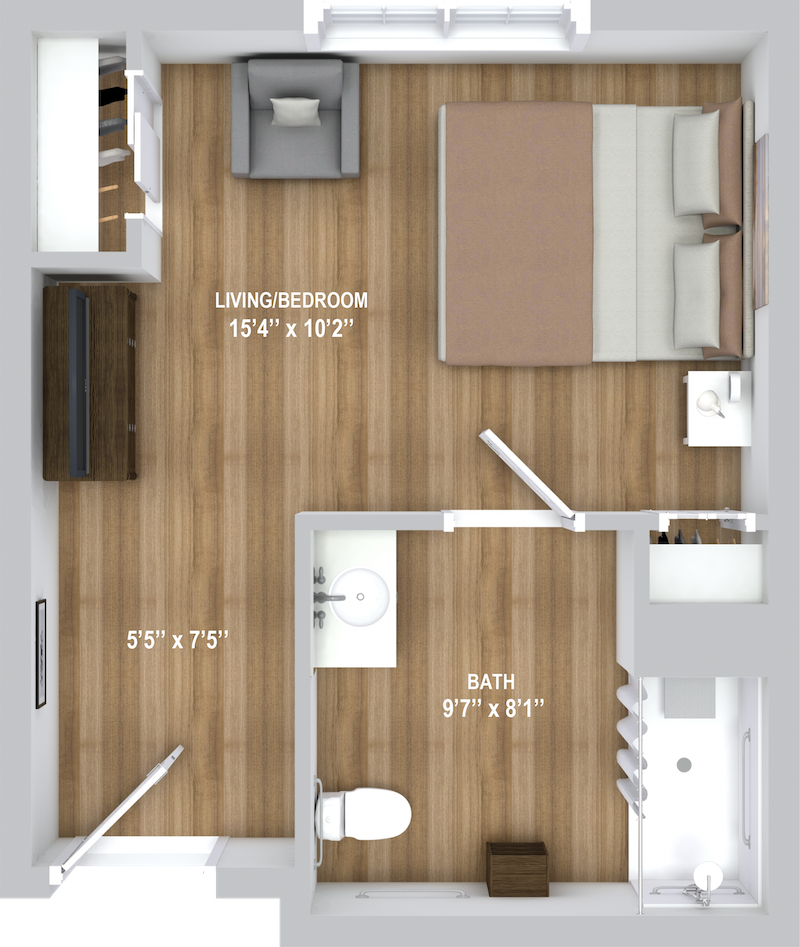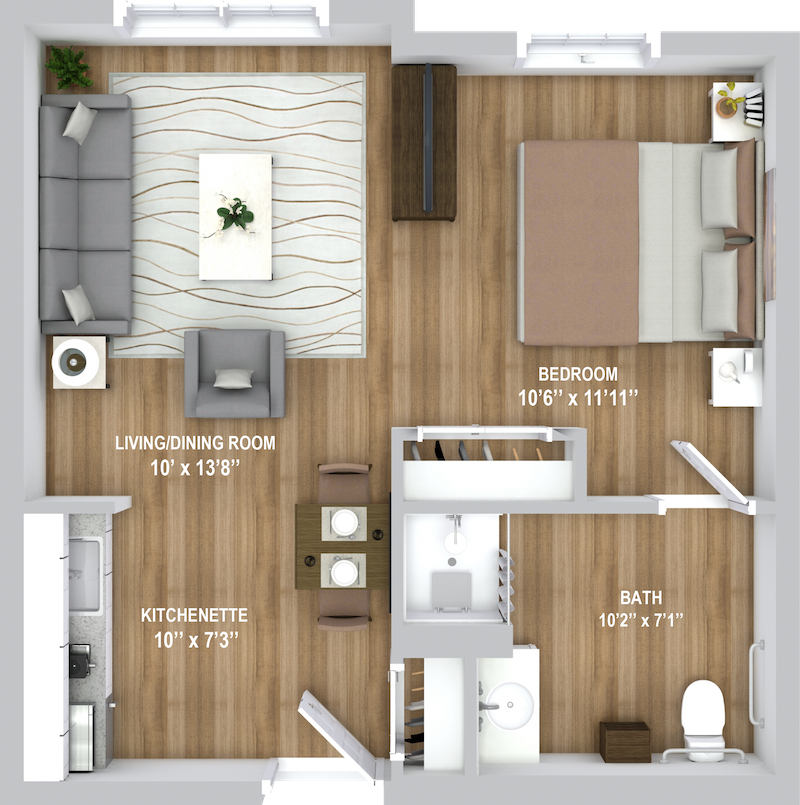Memory Care
Discover a home that promotes respect and quality of life through support and compassion.


Our Mission in Memory Care
- Minimize confusion and maximize positive moments
- Nurture independence and a sense of self
- Create structure and routine that provide a deep feeling of comfort
- Strengthen interpersonal connections with friends, family and new neighbors
- Support and encourage personal goals mentally, physically, emotionally and spiritually

Support Programs and Amenities
Comfort, respectful care and secure living empower our memory care residents toward rich and fulfilling lives while managing memory loss. Families of residents discover how professional support and a safe environment can help their loved ones.
- Access to skilled nursing: Residents and family members have peace of mind knowing these services are available on-site if needed
- Offering on-site therapeutic services, including occupational therapy: These services help residents maintain independence in performing familiar tasks
- 24-hour supervised care: Care is offered in a customized environment where residents are safe and encouraged to live fully
- 24-hour emergency response system
- Medication management: Memory, dementia and Alzheimer’s residents will never have to worry about coordinating their own medications; our trained staff safely handles all medications
- Three chef-prepared meals per day: Residents can enjoy a delicious and healthy menu prepared by our culinary staff that provides plenty of variety
- Weekly housekeeping: Bed-making and other services make memory care living as convenient as possible
- Personal laundry service: Residents can enjoy the convenience of personal laundry service throughout the week
- Full-Time Activities Coordinator
Memory Care Floor Plans
Memory care residents can choose from one of our stylish and comfortable apartments for memory support.
How Much Will I Pay?
We believe in fair and transparent pricing for all residents. For detailed pricing information, we encourage contacting our advisors, who can assess your unique financial situation and determine a plan that will be your best fit. Pricing for memory care residency can also vary if you’ve already joined our community prior to applying as a memory care resident.
MEMORY CARE FAQ
What Is Memory Care?
Memory care is support that is specifically designed to serve the needs of those with Alzheimer’s, dementia and other forms of memory impairment. At Concordia, we believe that individuals with memory impairments can continue to lead a rich, fulfilling and dignified life. Our programs allow everyone to thrive to the best of their abilities.
How Does the Memory Care Center Address Safety Concerns?
Our memory care center is staffed with dedicated and attentive care providers 24 hours per day, 365 days a year. Our discreet security systems, including a 24-hour emergency response system and an enclosed outdoor space, allow residents to move freely throughout the memory care center, indoors or out. The secured outdoor space includes beautiful raised garden beds for residents’ enjoyment.
What Makes Concordia’s Memory Care Different From Other Communities?
All the services provided in our memory care center — from dining to nursing to activities — are designed around the unique needs of the memory-impaired individual. By working closely with family members, we preserve the life story of every resident. We are focused on seamlessly integrating the past and the present to prevent loneliness, helplessness and boredom. Days are quietly structured to provide a sense of order. We strongly believe people with Alzheimer’s and other dementia deserve the opportunity to live to their fullest potential and we’re here to help make that happen.
Does Concordia Offer Short-Term Stays?
Is My Family Member or Friend Required to Share an Apartment With Another Memory Care Resident, or Are Private Residences Available?
All Concordia apartments are private. Our memory care center offers residents private, spacious studio apartments where they can surround themselves with personal items and enjoy the privacy they desire. There are two studio apartment floor plans to choose from: Memory Care Studio and Memory Support Delux Studio.
How Can I Be Involved With My Family Member or Friend’s Care?
Individuals with Alzheimer’s or other forms of dementia cannot always articulate their needs and preferences. With help from family members, we can better understand who the resident is now, as well as who they were before their memory loss. We will then know everything residents would share with us if they could – where they grew up, their past careers, favorite hobbies and major life events. With their families’ help, we will get to know residents in the way they deserve. Families will also take part in the daily care of residents by helping us create personalized care plans. Family caregivers can share the important details of their loved one’s unique challenges with memory loss, as well as their personal routines, so their care is seamlessly transferred from home to our community. We will also invite family members to participate in daily life with them, sharing in mealtimes or providing support during programming when they visit. We understand the needs of both residents and their families, so we will provide an environment where families can share life together.
How Do I Know if Concordia Life Plan Community Is Right for My Friend or Family Member Who Has a Memory Impairment?
At Concordia Life Plan Community, you’ll find a memory care center dedicated solely to supporting those with memory loss. Unlike other communities offering memory support in a skilled nursing wing, our memory care center is designed to meet the specific needs of those with memory loss and related cognitive impairments. From the layout of our secure community to our daily programming that promotes choice and celebrates accomplishments through familiar schedules and surroundings, every aspect of the community is created with memory care in mind.
How Much Does Memory Care Cost?
Oklahoma City memory care costs vary from community to community but are typically between $4,500 and $5,500 per month. Concordia’s memory care costs vary based on how you enter our community. With a full continuum of care, our residents can live here as healthy, active adults in independent living, through assisted living, skilled nursing and memory care, which will change pricing. For more information on our costs, visit our financial options page.
What Are the Care Options for Alzheimer’s Patients?
Individuals with Alzheimer’s have multiple care options. In the early stages of the disease, they may be able to live safely at home with minimal help from friends and family. As the disease progresses, they’ll need regular support, which can come in the form of a full-time family or friend caregiver, professional in-home care or memory care in a community like Concordia.
When Should an Alzheimer’s Patient Go to a Nursing Home?
Full nursing care, aka a “nursing home,” is required when the individual can no longer transfer themselves, feed themselves, etc. Someone living with Alzheimer’s should go to a nursing home when it will improve their quality of life or when It’s no longer safe for them to live at home. Services like housekeeping can alleviate stress and improve life, while wandering and sundowning can cause safety concerns, meaning the individual needs full-time support.
For caregivers, someone with Alzheimer’s should move to a community when you can no longer provide the care they need or when your own life is suffering due to your caregiving responsibilities. If you are overwhelmed or feel you cannot handle increasingly difficult situations, it’s time for professional support that relieves the burden. A move to a community makes the need to go to a “nursing home” less likely.
Does Medicare Pay for a Nursing Home for Alzheimer’s?
If you need help paying for memory care services, you can look into Oklahoma’s support resources here, which include programs from the State of Oklahoma and the federal government, including Medicaid. At Concordia, we may also be able to help you find an affordable option, but Concordia is not a Medicaid community. For more information, call us at 405-331-6113 or visit our cost calculator to explore more options.

7707 W Britton Rd
Oklahoma City, OK 73132
Phone: (405) 331-6113
Toll-Free: 1 (888) 489-0075
Fax: (405) 621-8701
Living Options
Our Community
Becoming a Resident
Foundation
Contact





